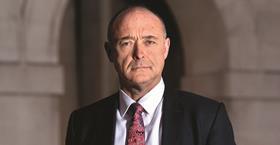The chair of the bar has hit back at the judge in charge of piloting out-of-hours courts, calling on him to clarify remarks suggesting the profession’s criticism of the controversial proposals is ‘ill-informed’.
Andrew Langdon QC (pictured) says it is ’perhaps unsurprising’ there have been ‘misunderstandings’ about the proposals, because there has been no proper consultation.
The frosty exchange was sparked by a letter last week in which judge in charge of reform Lord Justice Fulford insisted the plans are ’not a disguised attempt to persuade, or force… legal professionals and others to spend more time at court than they do at present’.
Fulford said he wanted to ’demystify’ the pilots, adding that he regretted ’the extent of widely-broadcast misunderstandings and ill-informed comments from a range of sources’.

In a pointed letter of response, Langdon says ‘nothing has been revealed’ to him in discussions with HMCTS which ’leads me to the conclusion that I am ill-informed’. On the contrary, he remarks, the ’working barristers’ he represents ’are perhaps in a better position to explain what they think the impact of shift-sitting will be than anyone employed by HMCTS’.
Langdon adds that he and other members of the bar, particularly the junior bar, have spent time trying to explain concerns about the scheme to HMCTS and ‘anyone who will listen’.
Langdon is not reassured by Fulford’s contention that the pilots are not to be feared because an evaluation will demonstrate whether lawyers’ concerns are valid. There is no detail yet of what the evaluation will entail, the bar chair stresses, and the first pilot (in Newcastle upon Tyne) might actually get under way before the criteria are finalised.
Langdon reiterates his belief that out-of-hours courts could set back plans to make the bar (and judiciary) more diverse, adding: ’If I am right, these reforms, caused by insufficient funding from successive governments, should be resisted’.
Until it is happy with the evaluation process, the bar will remain ‘very unhappy’ about engaging with the experiment, says Langdon.
He concludes: ’I hope you did not mean implicitly or otherwise to criticise the Bar Council, or for that matter the [Criminal Bar Association], in raising these concerns, and doing so vocally and vehemently. I wonder if, on reflection, you would be prepared, publicly, to make it clear that you did not mean to suggest that the bar leaders who have been grappling with this had been ill-informed or misunderstood?’
Meanwhile, in a blog post published last Friday, Law Society president Joe Egan also bemoaned the lack of a proper consultation on the plans, while stressing that Chancery Lane remains unconvinced there is reliable evidence that flexible courts pilot will mitigate current problems with the court system.
Nevertheless, Egan did indicate some progress has been made in talks with officials: ’While we still have a number of unanswered questions and concerns in relation to the pilots, HMCTS has responded positively to some of the issues the Law Society has raised,’ he says. ’At a recent meeting of the London Local Implementation Team, officials clarified that no legal representative will be required to attend court for both the early morning and the late afternoon courts in one day. If practitioners find themselves listed for both sessions, they will be able to request an alternative date or time. We await confirmation of this.’
He adds: ’HMCTS has also confirmed that the London pilot courts will deal with trials only, which will avoid any impact on the duty rotas. The Newcastle and Sheffield crime pilots will, however, be hearing a variety of cases, and we know that practitioners in those areas still have a number of concerns about the practicalities of the pilot.’

















![David Lester (senior partner at Blythe Liggins), Darryl Barnes, Jagdeep Sandher (head of dispute resolution at Blythe Liggins)[4]](https://d1d8vslyhr7rdg.cloudfront.net/Pictures/274x183/4/2/8/116428_davidlesterseniorpartneratblytheligginsdarrylbarnesjagdeepsandherheadofdisputeresolutionatblytheliggins4_981603_crop.jpg)






3 Readers' comments